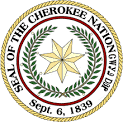Lucy Ward, The Wild Rose of Cherokee
In 1895 E. Sterling King penned a booklet by the lengthy name of, The Wild Rose of Cherokee, Or, Nancy Ward, "The Pocahontas of the West": A Story of the Early Exploration, Occupancy and Settlement of the State of Tennessee : a Romance, Founded on and Interwoven with History. [1] The book today seems archaic, written in a flowery language. It is also racially insensitive. In this story of Nancy Ward, a heroic Cherokee woman. She is a slender, nymph-like beauty, but this is not the result of her Native American ancestry, but because 'heaven blessed her with an over portion of her mother's saxon blood.' She does not have the 'large square face' of the typical Cherokee woman, she has only the tiniest bit of Cherokee blood, which gives her a pretty complexion, a 'rose-like' tint.
Nancy who at one point in the story is about to be killed by her brother, scoffs at her attackers and declares that she is the daughter of the 'White Lilly' and Oconostota, the great Cheeratahge of the Cherokee. King writes that the mother of Nancy Ward (the White Lilly) was an English woman by the name of Lucy Ward, daughter of Edmund Ward. Her father, Oconostota traveled to London with Sir Alexander Cummings in 1730 to meet the King. He was then fifty years old and widowed. Lucy, falls immediately in love with the Noble Savage Oconostota who returns her love with all his 'wild passionate soul'. (stopping to gag)
The pair was married in Westminster Abbey, with the full blessing of King George. In broken English the wild man says his vow to his White Lilly. Lady Lucy returns with him to Chota where she is soon showing those Cherokee women a thing or two about interior decorating, her house rapidly becomes 'the pride of the nation'. With her bible in hand she sets out to teach the 'rude' people of her husbands tribe. She was the ruler of her husband and darling of the Cherokee savages whom she ruled with love and kindness. She seems to have only had the one child, Nancy Ward, she has already died when the story of Nancy begins in King's book.
So was Lucy Ward a real woman? Is any of this true? Does anyone believe it's true? The short answers to these questions are no, no and yes.
In the story Oconostota is fifty years old when he travels to London in 1730. There are two problems with this: Oconostota was born around 1710 and he never went to London. [2] In the scant writings about the man, his family is almost never mentioned, no wife is ever named. Nancy Ward was not his daughter, neither was Raven his son.
The fact that this claim is easily disproved has not stopped folks from believing the story. Even the ridiculous Don Greene has included it in his 'Every Native is a Shawnee' books. Just the fact that it's in his book should be a clue that it's not true.
The King book should be seen for what it is, a window into the racist views of turn of the century Americans who believed that the only good Indian was one with a preponderance of Anglo-Saxon blood, that all Native males were brutes and savages, in need of a sweet white gal to tame their base instincts. There is nothing romantic about this story which holds no genealogical value.
Sources:
[1] E. Sterling King, "The Wild Rose of Cherokee, Or, Nancy Ward, "The Pocahontas of the West": A Story of the Early Exploration, Occupancy and Settlement of the State of Tennessee : a Romance, Founded on and Interwoven with History American Fiction, 1774-1920," Wright American Fiction, Vol. 3, The Ohio State University, University Press, 1895.
[2] Kelly, James C. “Oconostota” in Journal of Cherokee Studies, Fall, 1978 pp. 221; Hoig, Stanley, The Cherokees and Their Chiefs. University of Arkansas Press, Fayetteville. 1998


